PKK Takes Historic Step Towards Peace: Guns Burned in Symbolic Disarmament
Kurdish PKK Burns Guns in Historic Move Towards Ending Decades-Long Turkey Conflict
In a significant development aimed at fostering peace and reconciliation, the Kurdistan Workers’ Party (PKK) has initiated a symbolic disarmament process, marking a pivotal moment in the protracted conflict with the Turkish state. Approximately 30 PKK fighters, comprising both men and women, participated in a ceremony where they ceremonially placed their weapons into a large cauldron, setting them ablaze. This act signifies a crucial first step in a broader disarmament initiative that is expected to span the summer months.
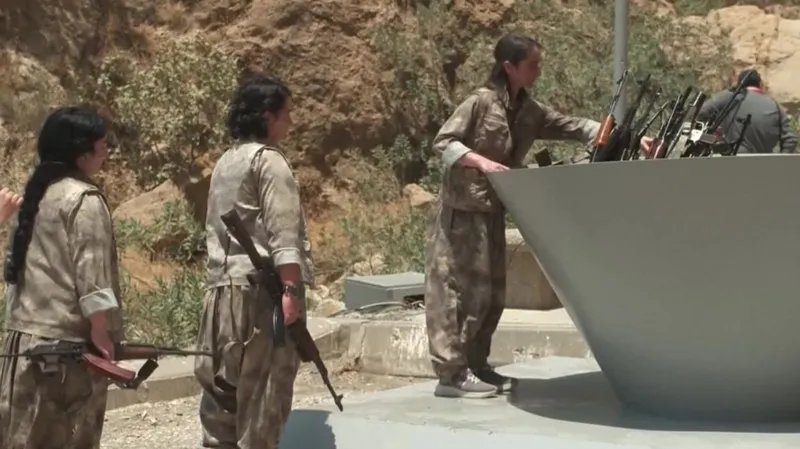
The Turkish government has welcomed this development, describing it as crossing a “critical threshold” towards achieving a “terror-free Turkey.” This move holds profound implications, not only for Turkey but also for the wider region encompassing Iraq, Syria, and Iran, where the conflict has had a significant impact. The 41-year-old conflict has tragically resulted in the loss of approximately 40,000 lives, with the PKK designated as a terror group by Turkey, the United States, the European Union, and the United Kingdom.
The Genesis of Disarmament
The disarmament ceremony took place at the historic Jasana cave, located approximately 50 kilometers northwest of Suleymaniyah in Iraqi Kurdistan. The event was attended by a select group of reporters and politicians, including members of Turkey’s pro-Kurdish opposition Dem party. The PKK fighters, including four high-ranking officials, solemnly placed their weapons into the cauldron, symbolizing a commitment to a new path.
In a statement, the group declared, “We voluntarily destroy our weapons, before your presence, as a step of goodwill and determination,” underscoring the historic and democratic nature of this initiative. This action aligns with the sentiments expressed earlier by the PKK’s long-imprisoned leader, Abdullah Ocalan, who described it as “a voluntary transition from the phase of armed conflict to the phase of democratic politics and law.” Ocalan, who has been held in solitary confinement on Imrali island since his capture in 1999, remains a pivotal figure for many Kurds.
According to reports from BBC Turkish, the disarmament process is set to continue in the coming months, with established points for weapons surrender involving the Turkish, Iraqi, and Kurdistan regional governments.
Understanding the PKK and the Conflict’s Longevity
This disarmament attempt represents the most promising hope yet for an end to the armed struggle that began in 1984. Originally founded as a Marxist organization, the PKK initially sought an independent Kurdish state within Turkey. By the 1990s, their demands evolved to advocating for greater autonomy for the Kurdish population, which constitutes about 20% of Turkey’s citizens.
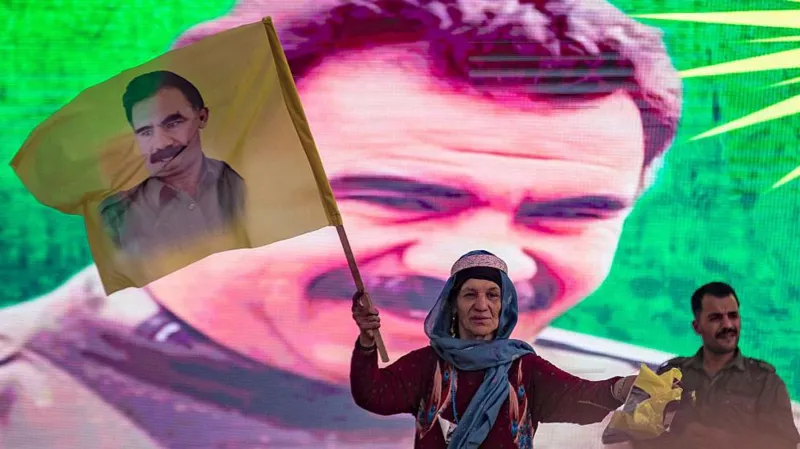
A fragile truce declared by Ocalan in 2013, which urged PKK forces to withdraw from Turkey, tragically collapsed in 2015. This breakdown led to devastating violence, particularly in southeastern cities like Diyarbakir, and resulted in Turkish air force strikes on PKK bases in northern Iraq, as well as military campaigns against Kurdish-led forces in Syria. The Turkish government had previously stated that further talks were contingent on the PKK laying down its arms, a condition that is now being met.
Motivations Behind the PKK’s Decision
The impetus for this significant shift appears to stem from political developments within Turkey. In October 2024, a prominent nationalist leader and key ally of President Erdogan, Devlet Bahceli, called for the PKK’s dissolution, suggesting a potential release for Ocalan from his Imrali island confinement. This call initiated a dialogue, with the Turkish government engaging in talks with Ocalan through the pro-Kurdish Dem party.
In February, Ocalan issued a historic appeal for the PKK to disband, read publicly by two Dem MPs who had visited him. His message emphasized a belief in “the power of politics and social peace, not weapons,” urging the group to embrace this principle. Ocalan cited the closure of democratic channels as a primary reason for the PKK’s formation, but recent overtures from Bahceli and President Erdogan have created what he deems a conducive environment for resolving the Kurdish issue through democratic means.
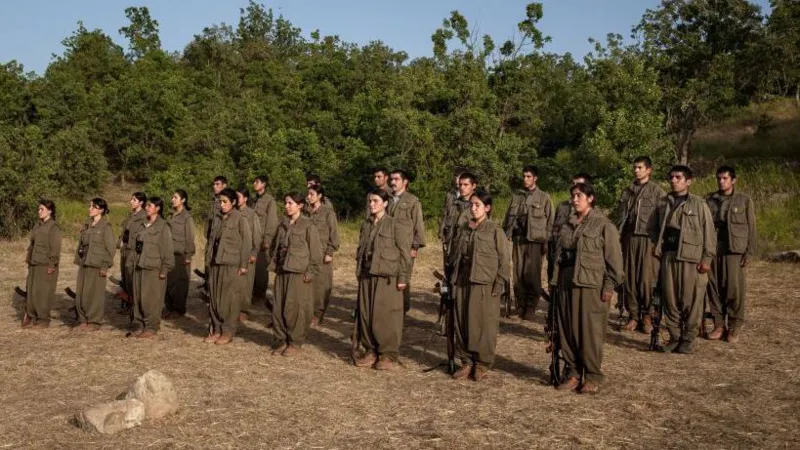
Following Ocalan’s appeal, the PKK declared a ceasefire and subsequently announced that it had “completed its historical mission,” stating that the Kurdish issue could now be resolved through democratic politics. President Erdogan affirmed this sentiment, viewing it as an “opportunity to take a historic step toward tearing down the wall of terror.”
The Enduring Influence of Abdullah Ocalan
Despite being reviled by many Turks for his role in the conflict, Abdullah Ocalan continues to hold significant sway among Kurds. Joost Jongerden, a specialist on the conflict at Wageningen University, notes that Ocalan “really has this authority; he is a main symbol for many Kurds, not all.”
Ocalan’s continued relevance was highlighted just days before the disarmament process began when he appeared in a video message, his first public appearance in over two decades. In the seven-minute address, he reiterated his call for peace and the abandonment of weapons, urging the PKK to embrace democratic politics. The simple beige Lacoste polo shirt he wore became an instant viral sensation, with retailers quickly selling out of stock.
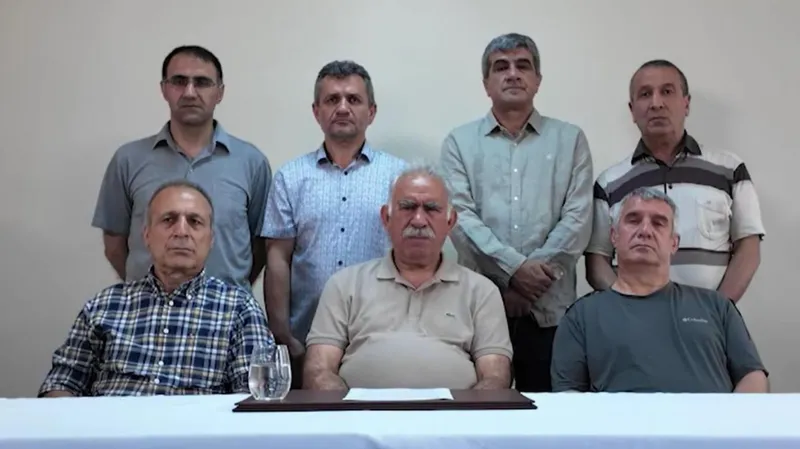
The Road Ahead
The focus now shifts to Turkey’s parliament in Ankara, where a commission will be established to deliberate on the subsequent steps for the government. Given the upcoming summer recess, concrete decisions are not anticipated for several months. Following the commission’s recommendations, parliamentary approval and President Erdogan’s final assent will be required.
The future of Abdullah Ocalan remains uncertain. While the government has indicated that his conditions of detention may be reviewed as the peace process progresses, any possibility of his release is likely to be considered in the later stages of this transformation.
Political Maneuvering and Constitutional Reform
The current political climate suggests that President Erdogan’s administration may leverage this peace process to bolster its domestic standing. Speculation abounds that the ruling AK Party is working on constitutional changes that could allow Erdogan to seek re-election in 2028, even as his current term concludes. Although the AKP and the Dem party deny any direct link between the peace process and constitutional reform, securing the Dem party’s support could significantly aid Erdogan in pushing through such changes.
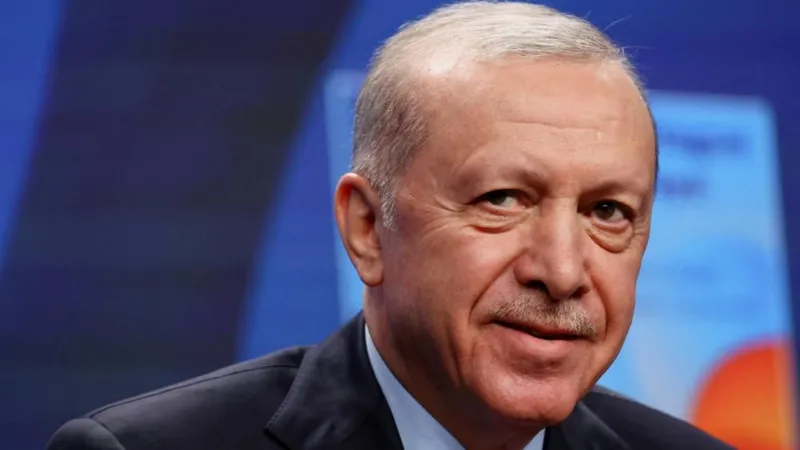
Erdogan is reportedly trailing in the polls. His primary opposition rival, Istanbul Mayor Ekrem Imamoglu, faces legal challenges and denies accusations of corruption, while other opposition mayors have been recently arrested as part of a wider crackdown. The unfolding peace process could therefore present a critical opportunity for Erdogan to reshape the political landscape and potentially secure his continued leadership.
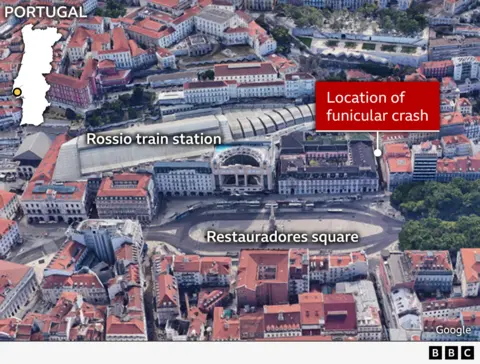

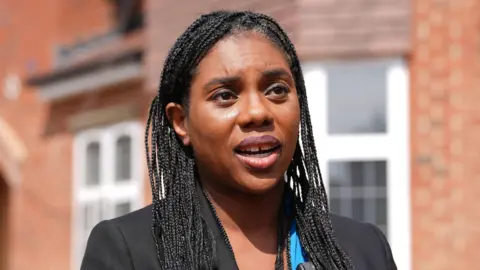
Post Comment